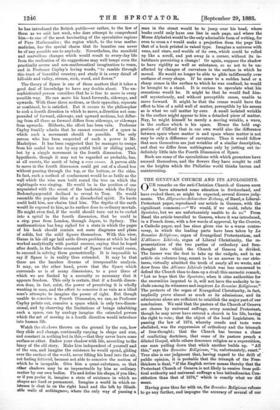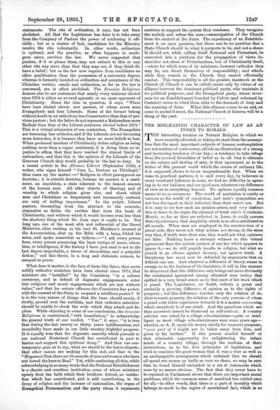THE GENEVAN CHURCH AND ITS APOLOGISTS.
OUR remarks on the anti-Christian Church of Geneva seem to have attracted some attention in Switzerland, and have evoked there, as might be expected, several diverse judg- ments. The Allgemeine-Schweitzer Zeitung, of Basel, a Liberal- Protestant paper, reproduced our article in German, with the significant commenb r—" We would, if we could, refute the Spectator, but we are unfortunately unable to do so." From Basel the article travelled to Geneva, where it was introduced, in a French dress, with a few words of approval, by the Courier, a Catholic paper, and has since given rise to a warm contro- versy, in which the leading parts have been taken by La Semaine Religieuse, organ of Evangelical Protestantism, and L Liberale, organ of Liberal Christianity, the re- presentatives of the two parties of orthodoxy and free- thought into which the Church of Geneva is divided. The former was the first to take up the cudgels, and in an article six columns long, meant to be an answer to our stric- tures, virtually admitted the truth of nearly all we wrote, and drew from the Alliance Liberals (which was less concerned to defend the Church than to dam-up a rival) this sarcastic remark, "Let us hope that the Spectator, when it cites authorities for the enormities imputed to it, will not have the audacity to in- clude among its witnesses and inspirers La Semaine Religieuse." The protests of the organ of Evangelical Christianity, in fact, impliedly prove almost as much as its admissions, and its admissions alone are sufficient to establish the major part of our conclusions. We said that the pastors of the Church of Geneva are chosen by universal suffrage, every nominal Protestant, though he may never have entered a church in his life, having the right to vote; that the object of the local Legislature, in passing the law of 1874, whereby creeds and tests were abolished, was the suppression of orthodoxy and the triumph of free-thought; that the Church has become a chaos of conflicting doctrines, that some of its pastors preach a diluted Gospel, while others denounce religion as a superstition, one man pulling down that which another builds up. "All this," says the Semaine Religieuse, "is, unfortunately, exact." True also is our judgment that, having regard to the drift of public opinion, it is probable that the triumph of the Free- thinkers is final, "if the English review means thereby that the Protestant Church of Geneva is not likely to receive from poli- tical authority and universal suffrage a less latitudinarian Con- stitution than that of 1874," which is exactly what we did. mean.
Having gone thus far with us, the Semaine Religieuse refuses to go any further, and impugns the accuracy of several of our
statements. The rite of ordination, it says, has not been abolished. All that the Legislature has done is to take away from the Company of Pastors the power of conferring it offi- cially; but as a matter of fact, candidates for the Ministry receive the rite voluntarily. In other words, ordination is optional, and the practice, as often happens in analo- gous cases, survives the law. We never suggested that pastors, if it so please them, may not submit to this or any other rite any more than that they may not, if they think fit, have a belief; but as the law now requires from candidates no other qualification than the possession of a university degree, whereas it formerly insisted on ordination and acceptance of the Christian verities, creeds and ordination, so far as the law is concerned, are in effect abolished. The &mains Religiettee demurs also to our statement that nearly every minister elected since 1874 is either an avowed agnostic or an open opponent of Christianity. Since the date in question, it says, " There have been elected eleven new pastors, of whom seven were Evangelicals and four Liberals. Some of the former belong withoutdoubt to an orthodoxy less Conservative than that of pre- vious pastors ; but the latter do not represent a Rationalism more Radical than that of the Liberal ministers elected before 1874." This is a virtual admission of our contention. The Evangelists are becoming less orthodox, and if the Liberals are not becoming more heterodox, it is because they have no more beliefs to lose. When professed teachers of Christianity define religion as being nothing more than a vague sentiment, it is doing them no in- justice to affirm that they have reached the utmost limits of rationalism, and that this is the opinion of the Liberals of the Genevan Church they would probably be the last to deny. In a recent article in the Alliance Liberal (September 15th), a writer, who signs himself "Jean L., Docteur en Th6ologie," thus sums up the matter :—" Religion in effect presupposes no doctrine ; it is outside doctrine, because its essence is a senti- ment, an impulsion, a state inherent to the inmost essence of the human soul. All other objects of theology and of worship to which religion gives rise, and about which men and Christians so desperately and incessantly contend, are only of trifling importance." In the pulpit, Liberal pastors, descending from the abstract to the concrete, stigmatise as fables the verities that form the basis of Christianity, and without which it would become even less than the shadowy thing which Dr. Jean says it ought to be. Not long ago, one of the most able and influential of the liberal Ministers, after reading as his text St. Matthew's account of the Annunciation, shut up the Bible with a bang, folded his arms, and spoke somewhat as follows :—" I ask every person here, every person possessing the least vestige of sense, educa- tion, or intelligence, if the history I have just read is not to the last degree improbable, a tissue of absurdities, and a palpable fiction ;" and this thesis, in a long and elaborate sermon, he essayed to prove.
What does it matter, in the face of facts like these, that seven mildly orthodox ministers have been elected since 1874, that ministers are " installed" by the Consistory " in a solemn ceremony, and in default of dogmatic engagements enter into religions and moral engagements which are not without value," and that for certain offences the Consistory has power, with the consent of the State, to suspend a rebellious pastor P It is in the very nature of things that the bane should surely, if slowly, prevail over the antidote, and that orthodox ministers should be unable to check the evils which they admit and de- plore. While objecting to some of our conclusions, the Semaine Beligienee is constrained, " with humiliation," to acknowledge the general truth of our verdict. "Yes," it says, "it is true that during the last twenty or thirty years indifferentism and incredulity have made in our little country frightful progress. It is equally true that the dogmatic anarchy which prevails in our national Protestant Church has contributed in part to hasten and support this spiritual decay." And then our con- temporary goes on to say, what we should be the last to dispute, that other causes are making for this end, and that in the "Huguenot Sion there are thousands of men and women who have not bowed the knee to Baal." Yet, while confessing all this, while acknowledging in so many words that the National Establishment is a chaotic and creedless institution, some of whose ministers openly flout the faith which their brethren defend, an institu- tion which has contributed, and is still contributing, to the decay of religion and the increase of' nationalism, the organ of Evangelical Protestantism and the party whom it represents
continue to support the system they condemn. They recognise the malady and refuse the cure,—emancipation of the Church from the control of the State. The expediency of an Establish- ment is an open question, but there can be no question that a State Church should be what it purports to be, and not a sham- It should not, while calling itself National and Protestant, be converted into a platform for the propagation of views de- structive not alone of Protestantism, but of Christianity itself, —views for which none of its ministers, however orthodox they may be, can divest themselves of responsibility ; and which, while they remain in the Church, they cannot effectually combat. This responsibility is all the greater, inasmuch as the Church (if Church it can be called) exists only by virtue of an alliance between the dominant political party, who maintain it for political purposes, and the Evangelical party, whose rever- ence for an Establishment founded by Calvin (and reformed by Carteret) seems to blind them alike to the demands of duty and the meaning of facts. When this alliance comes to an end, as come to an end it must, the National Church of Geneva will be a thing of the past.



































 Previous page
Previous page